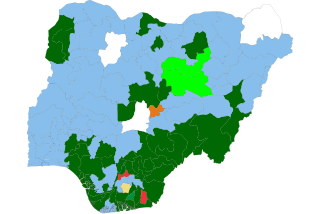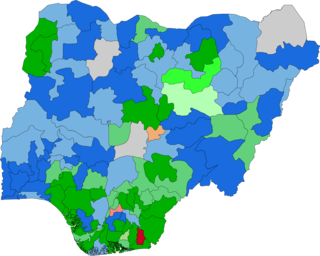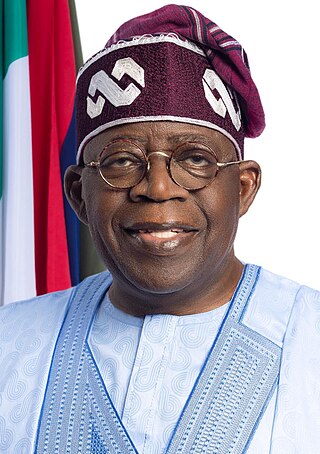| |||||||||||||||||||
4 of the 991 seats | |||||||||||||||||||
|---|---|---|---|---|---|---|---|---|---|---|---|---|---|---|---|---|---|---|---|
| |||||||||||||||||||
 |
|---|
The 2021 Nigerian state legislative elections were called to fill vacant seats in state Houses of Assembly.
| |||||||||||||||||||
4 of the 991 seats | |||||||||||||||||||
|---|---|---|---|---|---|---|---|---|---|---|---|---|---|---|---|---|---|---|---|
| |||||||||||||||||||
 |
|---|
The 2021 Nigerian state legislative elections were called to fill vacant seats in state Houses of Assembly.
The 991 members of the 36 state Houses of Assembly are elected from single-seat constituencies using first-past-the-post voting; when vacancies occur, by-elections (or bye-elections) are called, scheduled, and administered by the Independent National Electoral Commission.
On April 6, 2021, the member for Isoko North, Tim Owhefere (PDP) died from an undisclosed illness. [1] In March, INEC set the date for the by-election for April 10 with party primaries taking place between March 11 and March 20. [2] Jude Ogbimi, the PDP nominee, defeated runner-up Emmanuel Tabuko (APC) by over 83% and nearly 27,000 votes. [3] The election had 25.51% turnout and was conducted peacefully according to participating candidates.
| Party | Candidate | Votes | % | |
|---|---|---|---|---|
| PDP | Jude Ogbimi | 29,421 | 91.48 | |
| APC | Emmanuel Tabuko | 2,543 | 7.91 | |
| Other candidates | 196 | 0.61 | ||
| Total votes | 32,160 | 100.00 | ||
| Turnout | 32,658 | 25.51 | ||
| PDP hold | ||||
Candidates' vote share
On June 27, 2021, the member for Isoko South I, Kenneth Ogba (PDP) died from an unspecified heart-related disease. [4] In August, INEC set the date for the by-election for September 11 with party primaries taking place between August 4 and August 31. Ovuakpoye Evivie, the PDP nominee, defeated runners-up Ogaga Ifowodo (APC) and Michael Emumena Paul (SDP) by nearly 60% and over 5,500 votes. The election had 16.94% turnout and was successfully used as a test run for INEC's new Bimodal Voter Accreditation System (BVAS) device with candidates and observers praising INEC's conduct. [5] [6] [7] However, the election's successful conduct was overshadowed by the murder of a local vigilante by gunmen at Polling Unit 5 of Irri Ward 10 and the nonfatal shooting of another person in Oleh. [8] [7] After the election, INEC disclosed that five BVAS devices had been stolen during the election and implored Evivie to help find and return them. [9]
| Party | Candidate | Votes | % | |
|---|---|---|---|---|
| PDP | Ovuakpoye Evivie | 6,957 | 72.20 | |
| APC | Ogaga Ifowodo | 1,301 | 13.50 | |
| SDP | Michael Emumena Paul | 1,291 | 13.40 | |
| Other candidates | 87 | 0.90 | ||
| Total votes | 9,636 | 100.00 | ||
| Turnout | 9,807 | 16.94 | ||
| PDP hold | ||||
On January 31, 2021, member for Ekiti East I Juwa Adegbuyi (APC) died from an undisclosed illness. [10] In February, INEC set the date for the by-election for March 20 with party primaries taking place between February 26 and March 3. [11] [12] However, on the by-election date, multiple reports of violence and ballot snatching including the murder of 3 people at a polling station in Omuo where Senator Abiodun Olujimi was observing voting led INEC to suspend the by-election indefinitely. [13] [14]
| Party | Candidate | Votes | % | |
|---|---|---|---|---|
| AA | Olayinka Christiana Oluwayemisi | |||
| APC | Fatoba Oluwole Abraham | |||
| APGA | Ilesanmi Magret | |||
| PDP | Akintunde Adeyemi Adeniran | |||
| YPP | Idowu Ebenezer Alao | |||
| Total votes | 100.0% | |||
| Turnout | ||||
On January 18, 2021, member for Kafin Hausa, Adamu Babban Bare (APC), died from an undisclosed illness suspected to be cancer. [15] Later in January, INEC set the date for the by-election for March 6 with party primaries taking place between February 2 and February 8. [16] APC nominee and son of Adamu Babban Bare, Muhammad Adamu, defeated the PDP's Garba Tambale by 26% and over 6,300 votes. [17] The election had 39.86% turnout and was conducted smoothly according to lawmakers and INEC officials. [18]
| Party | Candidate | Votes | % | |
|---|---|---|---|---|
| APC | Muhammad Adamu | 14,924 | 62.77 | |
| PDP | Garba Tambale | 8,612 | 36.22 | |
| APM | Usman Isyako | 72 | 0.30 | |
| ADP | Ibrahim Abdulkarim | 69 | 0.29 | |
| ADC | Garba Musa | 56 | 0.24 | |
| AAC | Sani Haruna | 43 | 0.18 | |
| Total votes | 23,776 | 100.00 | ||
| Turnout | 24,392 | 39.86 | ||
| APC hold | ||||
On April 29, 2021, the seat of Sabon Gari was declared vacant after member Aminu Abdullahi Shagali (APC) did not attend legislative meetings for a prolonged period of time and did not submit a requested letter of apology to the House of Assembly. [19] In May, INEC set the date for the by-election for June 19 with party primaries taking place between May 18 and May 24. [20] The PDP nominee, Usman Baba, flipped the seat by defeating the APC's Musa Musa by 10% and over 1700 votes. [21] The election was conducted peacefully according to journalists but was marred by low turnout, at 13.43%. [22]
| Party | Candidate | Votes | % | |
|---|---|---|---|---|
| PDP | Usman Baba | 9,113 | 53.78 | |
| APC | Musa Musa | 7,404 | 43.69 | |
| PRP | Musa Halilu | 305 | 1.80 | |
| ADC | Anas Abdullahi | 62 | 0.37 | |
| ADP | Chindo Ibrahim | 61 | 0.36 | |
| Total votes | 16,945 | 100.00 | ||
| Turnout | 17,131 | 13.43 | ||
| PDP gain from APC | ||||

Uba Sani is a Nigerian engineer and politician who has served as governor of Kaduna State since 2023. He previously served as the senator representing Kaduna Central senatorial district from 2019 to 2023.

The table below shows the list of Nigerian senators of the 9th National Assembly. The Senate includes three senators from each of the 36 states, plus one senator for the Federal Capital Territory. The Senate president is the head of the house, and assisted by the deputy Senate president. The Senate president and his deputy also work with the principal officers in the house including the majority leader, deputy majority leader, minority leader, deputy minority leader, chief whip, deputy chief whip, minority whip and deputy minority whip.
The 2019 Kaduna State gubernatorial election occurred on March 9, 2019. APC candidate Nasir Ahmad el-Rufai defeated main opposition party PDP's candidate, Isah Ashiru, to emerge winner of the contest. APC was said to have won 14 LGAs, PDP nine.
The 2018 Ekiti State gubernatorial election occurred in Nigeria on 14 July 2018. APC Governor Kayode Fayemi who ruled from 2010 to 2014 won re-election for a second term, defeating Kolapo Olushola of the PDP.

The 2021 Anambra State gubernatorial election took place on 6 November 2021, to elect the Governor of Anambra State. Incumbent APGA Governor Willie Obiano was term-limited and could not seek a third consecutive term. APGA nominee, former Central Bank Governor Charles Chukwuma Soludo, retained the office for APGA with a 24% win over PDP nominee, former Transcorp CEO Valentine Ozigbo.

The 2022 Ekiti State gubernatorial election took place on 18 June 2022, to elect the Governor of Ekiti State. Incumbent APC governor Kayode Fayemi was term-limited and could not seek a third term. Former Secretary to the State Government Abiodun Oyebanji held the office for the APC by a 30% margin over first runner-up and SDP nominee—former Governor Olusegun Oni.

The 2023 Nigerian gubernatorial elections were held for state governors in 31 out of 36 Nigerian states. All but three elections were held on 18 March—concurrent with elections to every state house of assembly, three weeks after the presidential election and National Assembly elections—while the Imo State, Kogi State, and Bayelsa State elections will be held on 11 November. The last regular gubernatorial elections for all states were in 2019. All states have a two term limit for Governors which makes 18 incumbent governors ineligible for re-election.
The 2023 Jigawa State gubernatorial election took place on 18 March 2023, to elect the Governor of Jigawa State, concurrent with elections to the Jigawa State House of Assembly as well as twenty-seven other gubernatorial elections and elections to all other state houses of assembly. The election — which was postponed from its original 11 March date — was later scheduled to hold three weeks after the presidential election and National Assembly elections. Incumbent APC Governor Mohammed Badaru Abubakar was term-limited and could not seek re-election to a third term. Deputy Governor Umar Namadi held the office for the APC by a margin of 24% over PDP nominee Mustapha Sule Lamido — a businessman and son of former Governor Sule Lamido.
The 2023 Kaduna State gubernatorial election was held on 18 March 2023, to elect the Governor of Kaduna State, concurrent with elections to the Kaduna State House of Assembly as well as twenty-seven other gubernatorial elections and elections to all other state houses of assembly. The election — which was postponed from its original 11 March date — was held three weeks after the presidential election and National Assembly elections. Incumbent APC Governor Nasir Ahmad el-Rufai was term-limited and could not seek re-election to a third term. Senator Uba Sani retained the office for the APC by a margin of less than 1% — under 11,000 votes — over first runner-up and PDP nominee Isa Ashiru, a former member of the House of Representatives.
The 2019 Nigerian Senate election in Kaduna State held on February 23, 2019, to elect members of the Nigerian Senate to represent Kaduna State. Kwari Suleiman Abdu representing Kaduna North, Sani Uba representing Kaduna Central both won on the platform of All Progressives Congress. while Laah Danjuma Tella representing Kaduna South returned to parliament on the platform of People's Democratic Party
The 2015 Nigerian Senate election in Jigawa State was held on March 28, 2015, to elect members of the Nigerian Senate to represent Jigawa State. Abdullahi Abubakar Gumel representing Jigawa North West, Mohammed Sabo representing Jigawa South West and Muhammad Shitu representing Jigawa North East all won on the platform of All Progressives Congress.

The 2023 Nigerian Senate elections were held on 25 February 2023 in all 109 senatorial districts where voters elected senators using first-past-the-post voting. The last regular senatorial elections for all districts were in 2019.
The 2015 Nigerian House of Representatives elections in Nasarawa State was held on March 28, 2015, to elect members of the House of Representatives to represent Nasarawa State, Nigeria.
The 2023 Nigerian House of Representatives elections were held on 25 February 2023 where voters elected members of the House of Representatives using first-past-the-post voting in all 360 federal constituencies. The last regular House elections for all districts were in 2019.

In Nigeria, a House of Assembly is the state-level legislature. All Houses of Assembly are unicameral, with elected members who are designated as members of the House of Assembly, assemblymen, or MHA, and who serve four-year terms.
The 2022 Nigerian state legislative elections are called to fill vacant seats in state Houses of Assembly.
The 2022 Nigerian House of Representatives elections are called to fill vacant seats in the House of Representatives.
The 2021 Nigerian House of Representatives elections are called to fill vacant seats in the House of Representatives.

The 2023 Nigerian presidential election was held on 25 February 2023 to elect the president and vice president of Nigeria. Bola Tinubu, the former governor of Lagos State and nominee of the All Progressives Congress won the election with 36.61% of the vote, just under 8.8 million votes to defeat over runners-up former vice president Atiku Abubakar and former governor of Anambra State Peter Obi. Other federal elections, including elections to the House of Representatives and the Senate, held on the same date while state elections were held on 18 March. The inauguration was held on 29 May 2023.
Elections were held throughout Nigeria throughout 2022. During the year, the governors of Ekiti and Osun states were elected on 18 June and 16 July, respectively. Additionally, there were also elections to fill vacant seats in the House of Representatives and state houses of assembly along with local elections in Adamawa State, Benue State, Edo State, Enugu State, the Federal Capital Territory, Imo State, Katsina State, and Kebbi State.